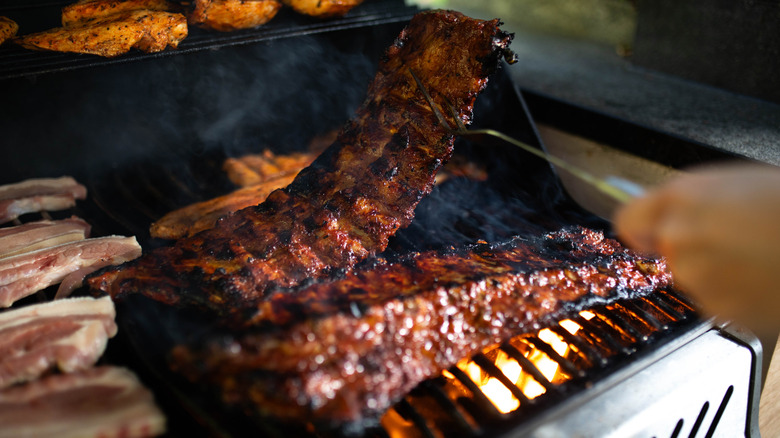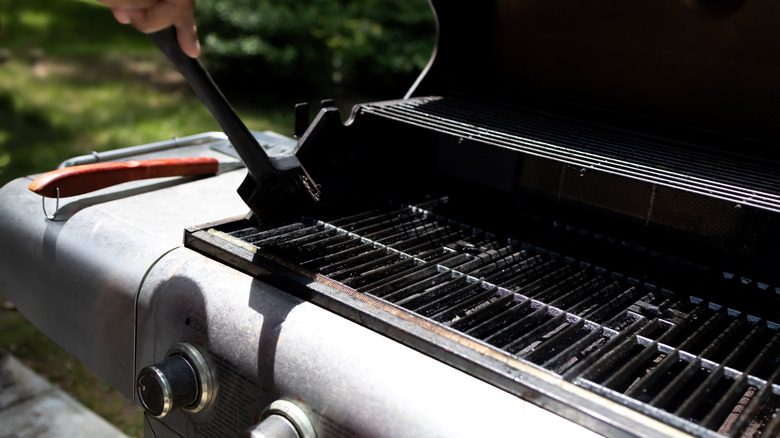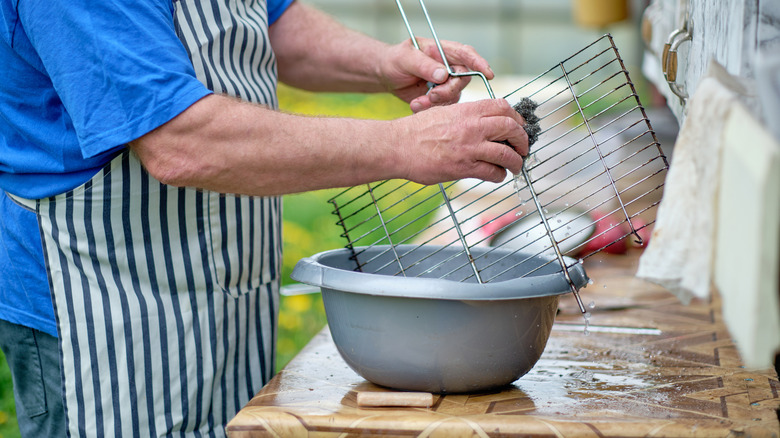Never Skip This Cleaning Step After Grilling Or You Could Ruin Your Next Meal
It's summertime and you can't wait to show off your grilling skills at the backyard cookout, so you fire up the grill to flip those pork chops slathered with your go-to marinade to make the meat tastier. Everything's going smoothly until you lift the lid and spot a layer of creosote buildup on the grates. You brush it off (again), telling yourself you'll get to it next time. But, let's be honest, there have been more than a few of those next times. You might want to reconsider, because ignoring it doesn't just mess with the flavor of those chops. It could also mean serving up a side of harmful microorganisms: One study (via Good Housekeeping) found the average barbecue grill has more than twice as many germs as the typical toilet seat!
So, cleaning it thoroughly is non-negotiable. If you're wondering how to go about it, there are plenty of ways to keep your grill shiny and clean, but one step you shouldn't skip is scraping the grill with a metal tool. Once that's done, empty the debris collected in the removable ash pan. It's the best way to clear out greasy buildup and give your grill a solid reset before your next cookout.
How to clean your grill the right way
To make cleaning easier, fire up your grill on high for a few minutes. The heat helps loosen stubborn buildup and can knock out some bacteria (just keep in mind that high heat isn't a surefire way to kill all harmful bacteria — follow through with a proper clean). Many experts, including Jamie Oliver, swear by this simple step to make scrubbing the grates a breeze. But don't stop there; skipping the ash cleanup can block air vents, which impacts airflow and performance. While it's tempting to leave the ash sitting in your grill for days, especially after a good cookout and a few beers, try to get back to it as soon as you can. Piles of ash tend to soak up moisture and turn into clumpy messes that are a pain to scrape out later. The smart move is to empty it the same day you grill, preferably into a metal ash bucket.
You can use a wired grill brush to get the job done, but remember to wipe your grill with a wet cloth before using a wired brush since these brushes tend to leave errant bristles when brushed on a dry surface. This can lead to accidents if it gets mixed up with your food. Also, consider switching to lump charcoal instead of briquettes; it burns cleaner and leaves behind less ash. Lastly, don't skip cleaning the inside of your grill with some good old soap and water; it makes all the difference.
Give your grill a final polish with pantry staples
While soap and water are the easiest go-tos, a few household items can help you go the extra mile to kill bacteria or lift stubborn residue. One unexpected ingredient for this purpose is an onion. Yep, not kidding. Rub a cut onion over the grates after you've scraped and washed them. It helps remove stuck-on bits that even soap and water might miss. Just skip this step if you're grilling foods other than meat; you don't want that whole grilled pineapple tasting like a blooming onion. Another trick is to brew some coffee, pour it into a bucket, and soak the grates for at least an hour. The acid in the coffee helps break down grease, but you have to give it time to do its job.
You can mix and match these hacks to keep your grill from becoming a bacteria hotspot, but make sure you have a few basics in place. First, before you start scraping, suit up with kitchen gloves and eye protection. If you notice metal flaking off, stop scrubbing; it's a sign your grill grates need replacing. No amount of cleaning can save your next meal if your grill's falling apart. There are also some foods you should think twice about before throwing them on the grill. Bacon, for example, can cause flare-ups from dripping fat while meats coated in dairy-based marinades may scorch, curdle, and cling stubbornly to the grates.


